A policing bill introduced in Illinois this week that would prevent officers from pulling people over for speeding or not displaying license plates would be a “gift” to criminals and a “backdoor” way to defund the police, a retired Illinois police chief warned.
“Criminals will love it,” retired Riverside Police Chief Tom Weitzel told Fox News Digital of House Bill 4603. “… it’s a ‘here it’s your birthday or Merry Christmas, here’s a gift for you.’”
Democratic state Rep. Justin Slaughter introduced the bill Monday, which would prohibit cops from pulling people over for traffic infractions such as: speeding up to 25 miles per hour over the limit; driving with an expired registration sticker; failing to display registration plates or stickers; not wearing a seat belt; or driving with defective mirrors and excessively tinted windows.
Slaughter told Fox News Digital on Wednesday that the bill was intended to “start the conversation” on justice reforms and racial profiling, noting that the bill as drafted is “very broad.” He said he doesn’t aim to champion the bill this session, but introduced it to open the door to conversations on the matter.
ILLINOIS ENDING CASH BAIL A ‘BACKDOOR’ DEFUND MOVEMENT THAT WILL SPARK POLICE EXODUS: EXPERTS
Tom Weitzel when he was police chief of Riverside, Illinois. (Tom Weitzel )
The initial introduction of the bill, however, caused controversy among police leaders, who immediately slammed the proposal as one that would further tie police hands from carrying out their jobs and protecting the community.
Weitzel served as police chief of Riverside, a suburban village in Cook County located about 12 miles outside of Chicago, from 2008 to 2021, when he retired. He served in law enforcement for 37 years, which included him being ambushed and shot in the line of duty in 1987 by Chicago criminals.
The former chief explained that the new bill, if it should pass, would promote more crime in Illinois and tie officers’ hands from carrying out core tenets of the job.
“This is like a backdoor way to defund the police. And they want to stop a core function of law enforcement,” Weitzel argued.
He said that traffic crashes and accidents will increase if the bill passes and becomes law, motorists will further disrespect police and safe driving practices, and overall promote a “reckless” culture.
“Complaints to suburban police departments will rise for sure about speeding. Traffic enforcement is a core function and especially in suburban police departments. That’s one of the top complaints that chiefs will get: parking complaints, speeding complaints in the neighborhoods, near schools, near churches, and even in larger cities, that’s true. It’ll take away the ability to control traffic, you will definitely see traffic accidents and crashes go up,” he said.
COURT CLEARS WAY FOR ILLINOIS TO BECOME FIRST STATE TO ERADICATE CASH BAIL
Traffic stops often lead to police discovering other criminal activities, such as outstanding warrants, with Weitzel pointing specifically to how drivers with no license plates are oftentimes thieves or other criminals who swap plates to carry out crimes.
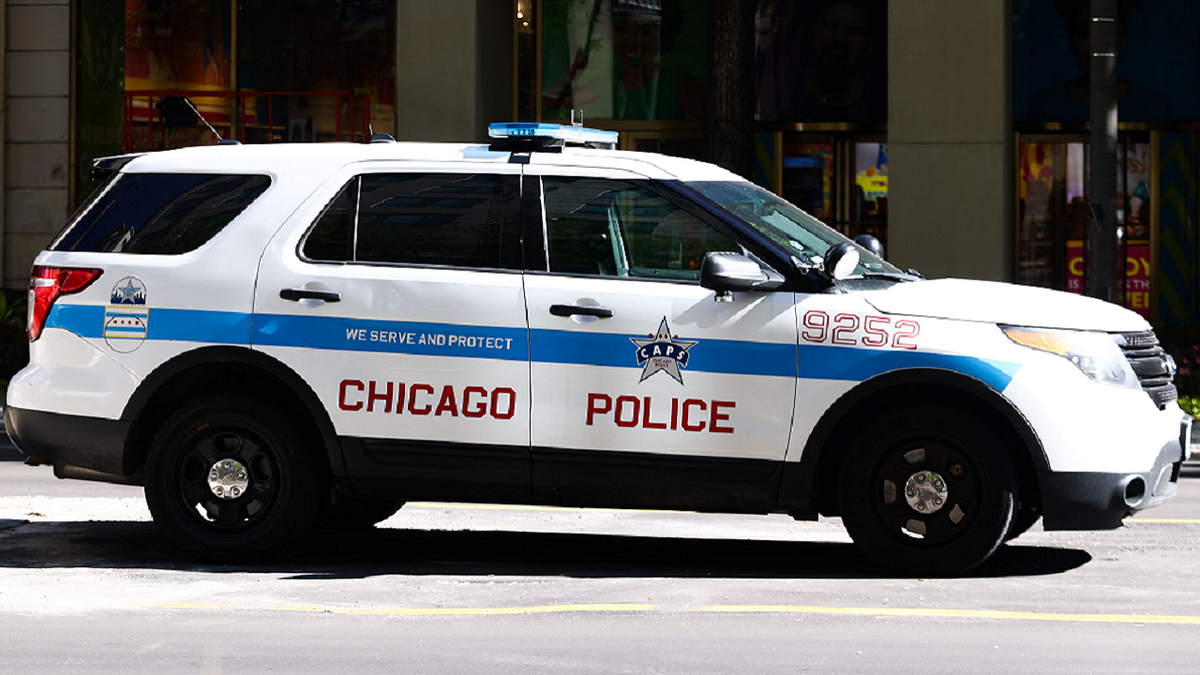
Chicago Police Department vehicle on city street. (Beata Zawrzel/NurPhoto via Getty Images)
“Individuals constantly change license plates on their car or steal license plates. It’s very common to steal a license plate from a parking lot of a mall or movie theater, throw it on your car and then go out for a couple hours, commit crimes with that license plate on it. And then when they’re done doing their crime spree, they take that license plate off to dump it. And they either drive with no plates to go dump the car or they put the actual plates on. That happens with frequency,” he said.
Weitzel also highlighted what he described as a “ludicrous” part of the bill that would prevent officers who pull someone over for speeding more than 25 miles per hour over the limit from using any evidence found during the traffic stop at a trial – even if they had the driver’s consent to search the vehicle.
“Even if you ask ‘Hey, may, I search your car’ and the driver says yes, and it’s on video, you still can’t search the car. And if you do, any evidence that you get, you cannot use at trial. That doesn’t make sense,” he said, adding that the language of the bill is incredibly strong and doesn’t allow for interpretation.
“The bill also notes that officers who stopped anyone speeding above 25 miles an hour cannot use the evidence from the traffic stop at trial even with consent. It doesn’t say maybe or anything, it clearly says ‘cannot use,’” he said.
Slaughter told local media this week that bill is intended to open a conversation on racial bias in Illinois at the hands of police.

Tom Weitzel when he served as Riverside, Illinois’ police chief. (Tom Weitzel )
“For decades, Illinois has wrestled with the challenge of racial bias in traffic stops, and the disparate outcomes that are too often the result,” Slaughter said in a statement, according to WCIA. “At no point in this effort has anyone’s goal been to take away the tools police need to keep communities safe, but instead to continue an important conversation. House Bill 4603 continues that conversation. It’s my hope that discussions with law enforcement and advocates can identify minor infractions that on their own do not necessitate a traffic stop.”
Weizel said Slaughter’s characterization of Illinois police rampantly racially profiling drivers is “completely false.”
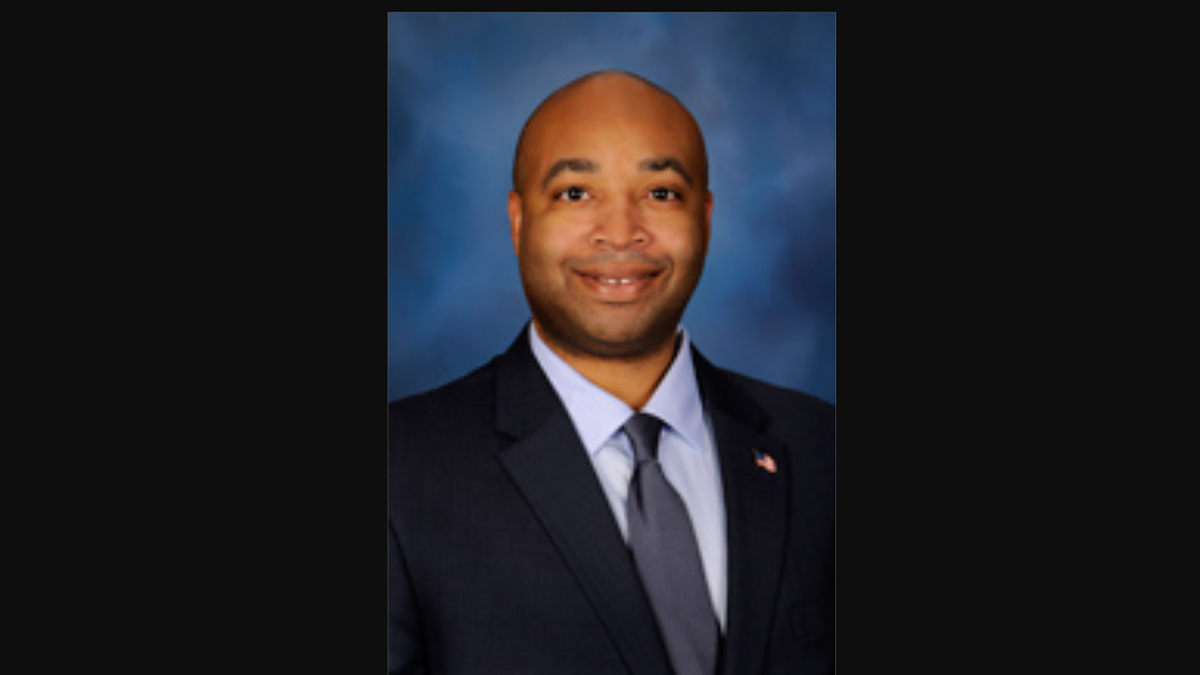
Democratic Illinois state Rep. Justin Slaughter. (Illinois General Assembly )
“For decades, law enforcement has had to submit, through the Illinois Department of Transportation, this traffic stop data … and then it had an independent organization review it in a report that’s issued to the governor in the state legislature every year. That report doesn’t show any bias or racial profiling. It does show how many traffic stops are made, etc. It does show the racial breakdown; male, female,” he said.
Slaughter explained to Fox Digital that he was inspired by former President Barack Obama’s legislation in 2003, when he served as an Illinois state senator. Obama sponsored a racial profiling law that gathered data on every police stop in the state, which was under a five-year sunset provision before Slaughter made the law permanent in 2019.
“The racial gap is widening. Data will show that the problem is a statewide problem in Illinois. We’re also seeing that law enforcement is increasingly failing to comply with this law,” Slaughter said. “…Now in fairness to law enforcement, in fairness to law-abiding citizens in Illinois, the bill as drafted is very broad. [It’s] banning too much in regards to traffic stops.”
“I understand the the reaction, but the intent was not to get that reaction as much as it was to start the conversation,” he continued. “And to start to have a comprehensive dialogue with stakeholders, with law enforcement, with citizens around this particular subject matter. And the end result of any sort of bill or law undoubtedly would be more narrow.”
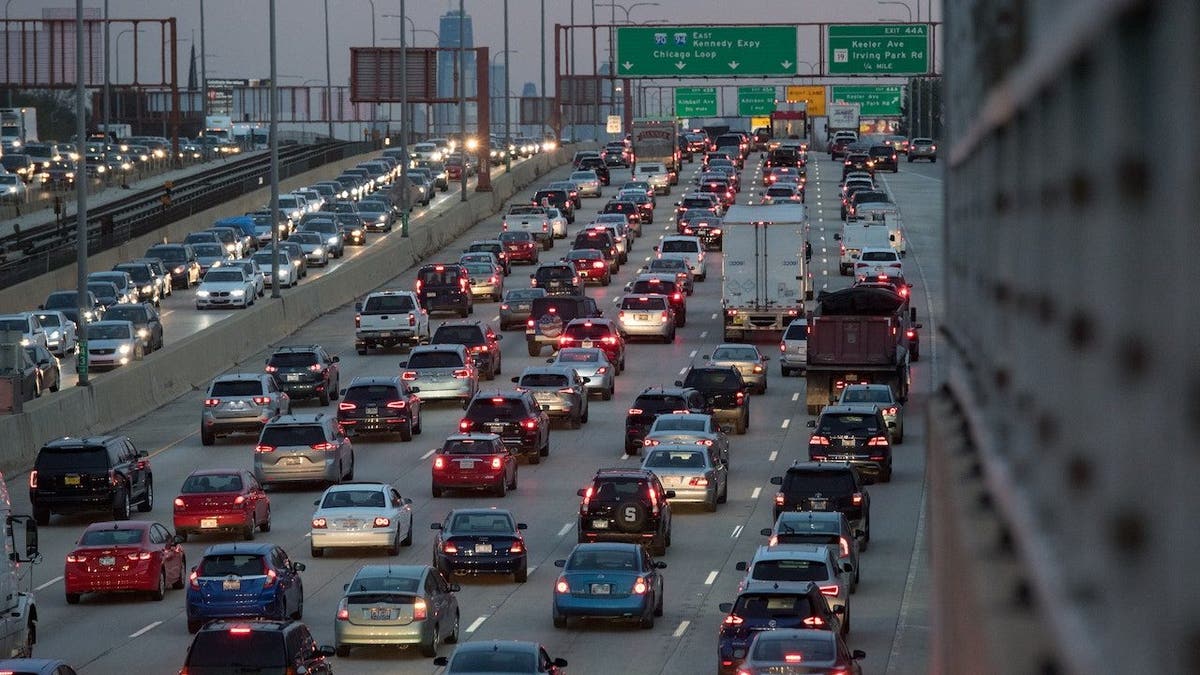
A Chicago traffic jam. (Patrick Gorski/NurPhoto via Getty Images)
Weitzel said the effort is another attempt by local Democrats to defund the police, which he slammed as a failed “disaster” that has led to plummeting recruitment and retention rates in the Prairie State.
“Defund the police is over. If you haven’t realized it, look around America. Defund the police was a disaster. It was more of a talking point and some type of 30-second soundbite,” he said. “
“The problem is that police can’t recruit and retain anymore. So the damage was done up front. And now we’re going to have to be paying for it for 10 years to try to get staffing and retention,” he said. “It’s almost like [Slaughter’s] painting all law enforcement officers as biased.”
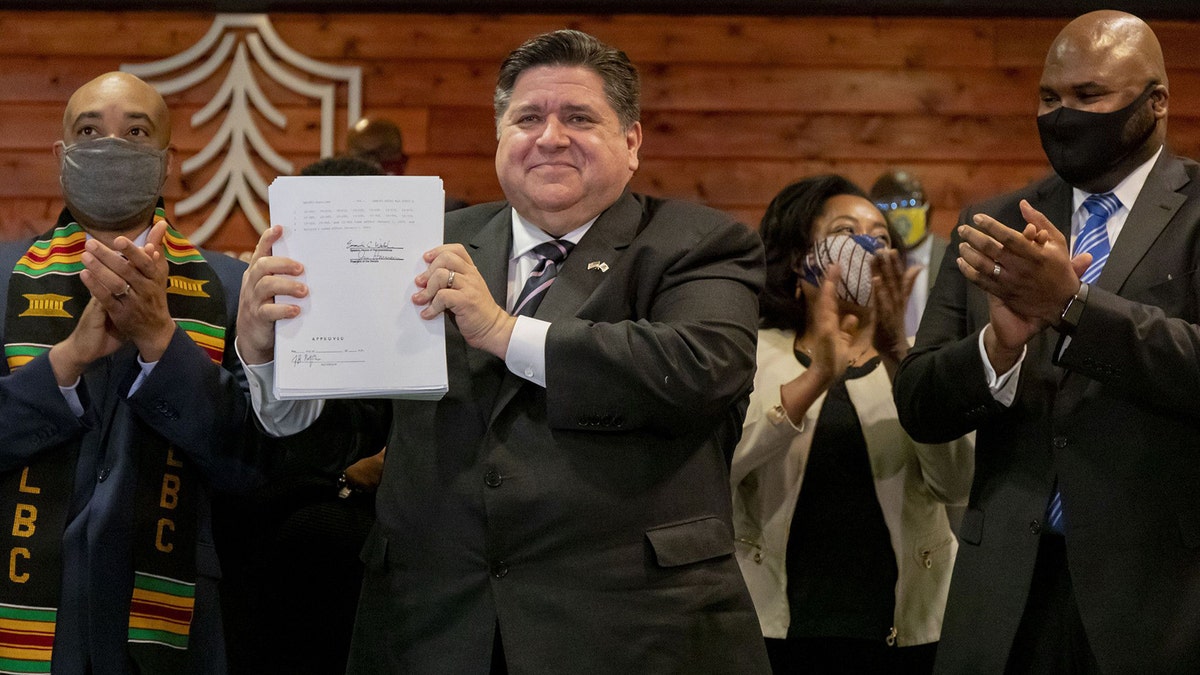
Gov. J.B. Pritzker is joined by lawmakers and community advocates including state Rep. Justin Slaughter, left, and state Sen. Elgie Sims Jr., right, as he signs HB 3653, a sweeping criminal justice and police reform bill, on Feb. 22, 2021. (Brian Cassella/Chicago Tribune/Tribune News Service via Getty Images) (Getty Images )
“Of course our profession has idiots like every profession. You know, we’re not perfect. But it’s a small minority of police officers. And the best way to handle that is chiefs need to act immediately and get rid of those officers through legal means. To say that a majority of law enforcement has some built-in bias is completely false.”
Weitzel said that police in Illinois are increasingly leaving the state for jobs in states such as Florida and Texas, where they receive pay bonuses and support from local leaders who respect cops, and that this bill would only make it more difficult to recruit and subsequently retain officers.
The bill was proposed months following the implementation of Illinois’ Safe-T Act, which Slaughter also played a key role in crafting, and would compound crime and give criminals a “gift” to skirt justice, the retired Riverside chief argued. Among other reforms, the Safe-T Act ended cash bail.
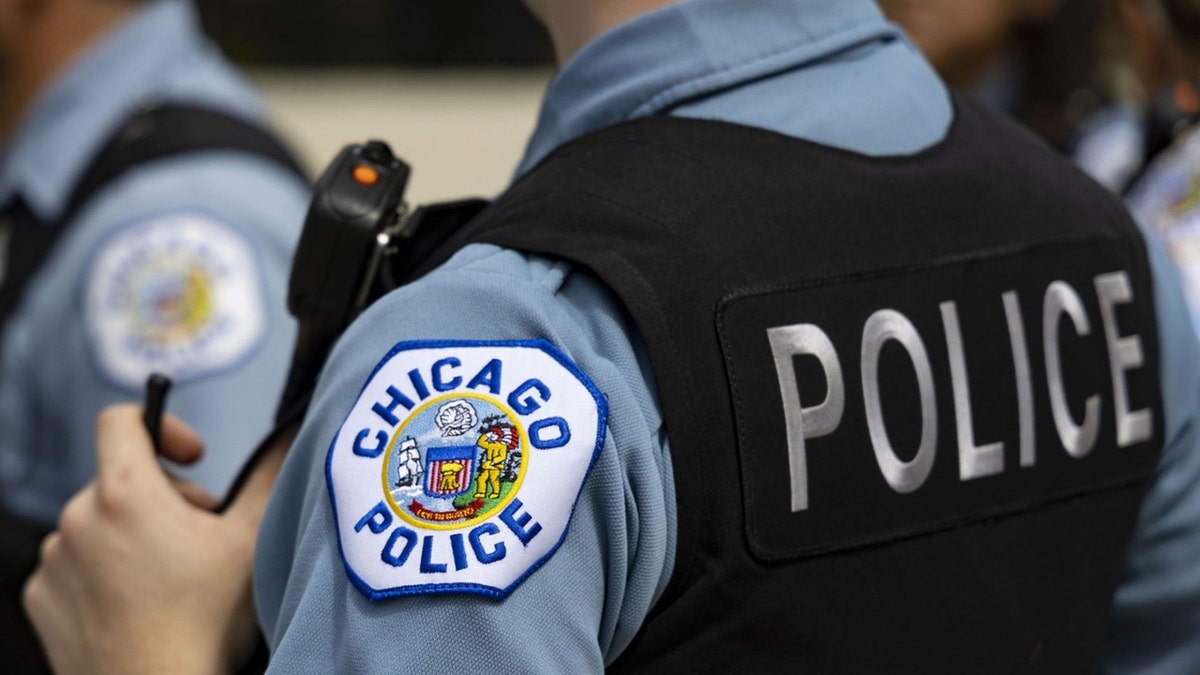
Chicago police officers in the West Englewood neighborhood of Chicago. (Brian Cassella/Chicago Tribune/Tribune News Service via Getty Images))
“A lot of [suspects] will tell the officers, ‘Hey, the Safe-T Act, I know you can’t hold me, so go ahead and process me.’ Which is true and you gotta let them go. So they’re gonna see something like this and they’re gonna say, ‘You know what, the cops, they can’t stop us. So if we keep it under 25 miles an hour, even if I have fake plates on or if I have fictitious plates on or I put somebody else’s plates, they really can’t use that as a stop as a reason to make a traffic stop,'” he said.
Following rhetoric in 2020 to defund the police after the killing of George Floyd in Minneapolis, local Illinois politicians, most notably in Cook County, felt emboldened to “disrespect” police and push through legislation such as the Safe-T Act without properly gathering insight from cops on how such legislation would affect public safety and policing, Weitzel argued.
With this bill, Weitzel says it appears Illinois lawmakers want to strip police of any patrol duties, and effectively turn them into firemen.
CLICK HERE TO GET THE FOX NEWS APP
“They want to turn this into firemen,” he said. “Firemen, they wait in the station until the call comes out. That’s not a criticism, that’s just what they do. Well then, you know what they’ll want policemen to do? Just go find a parking lot and sit there all day long, and answer your radio calls. Period. That’s it. Don’t do any patrol. Don’t be any aggressive patrol. Don’t do any preventative patrol,” he said.
Slaughter told Fox News Digital that he’s “confident” that he will eventually have “the meaningful, fruitful conversation that we need” regarding the bill in the future – though not the immediate future.